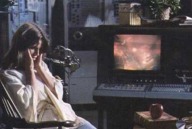







 |
 |
 |
 |
 |
 |
 |
 |

| DEMON SEED (1977) | |
|
|
An anticipating clichéd cinematic event rests within Demon Seed, as the story deliberately applies several different themes from more than a few films.
Yet the film pulls off a captivating (pun intended) nightmare about the super computer Proteus IV based on Dean Koontz’s novel with the same name.
To some extent the film overcomes the unoriginal perspective by encapsulating a tense and dark atmosphere generated by the power of Proteus.
This helps keep the audience’s attention intact through this science fictionalized horror tale where a computer desires the ability to feel touch.
The black background with deep red opening credits and an expanding dot accompanied by a subdued and digitalized wailing accentuates the apprehensive anticipation of what is to come. Contrastingly smooth, the scene switches into the sun rising over a hill, as the opening credits continue. Symbolically, the beginning offers a suggestion towards the birth of something sinister. Through brief editing, a small number of images lead the story to a valley where a company has been working under tight security for eight years. It is here the film begins with the birth of artificial intelligence, which is named Proteus IV. Proteus’ function will simplify the human existence; possibly turn the human race to a flock of sheep, as the computer will begin to think for the humans. This is a threatening concept, if the computer were to take charge over the human being, which will happen in Demon Seed. However, this is not a unique idea, as it has seen the silver screen before in films such as the brilliant 2001: A Space Odyssey (1968) where the demonic computer HAL 9000 controls and apocalyptic Colossus: The Forbin Project (1970) where the computer controls the weapons of United States. The difference with Demon Seed and its predecessors is that here Proteus will take power over one home, the home of the chief scientist Alex Harris (Fritz Weaver) where his wife Susan (Julie Christie) lives by herself after their separation. Through Proteus’ ability to reason it has acquired the aptitude to understand and learn. It has also generated an internal curiosity within the super computer to understand humans and why they do what they do. During a brief meeting Proteus inquires when he is going to be released outside of the box to which Alex laughs; however, Proteus understands that he will not receive any help from anyone and begins to make plans of his own. Through a link between Proteus and a private lab in Alex’s home, the computer initiates his own entry out of the box. Unaware of Proteus’ intentions Susan becomes the computer’s captive, as it begins to study Susan biologically, behaviorally, and logically. There are scenes that have strong sexual undertones, as Proteus’ determination is to generate a life outside the box. However, these sexual implications have pure reproductive purposes, as Proteus alters DNA. This follows pretty much the same idea that Mary Shelly created with her Gothic novel Frankenstein where the man attempts to create artificial life, and yes there is artificial insemination. The birth of such a child presents another dreadful thought. This is a theory conceptualized in Rosemary’s Baby (1968) where Satan impregnates a woman, while in Demon Seed the conception is the ultimate connection between human and machine. Demon Seed pours several already applied ideas into a blending machine that concocts a strange brew that at times feel bizarrely frightening.
However, the use old material also generates a sense of unoriginality, which produces a feeling of déjà vu.
The cast performances do not help the film, as the characters feel excessively artificial.
Nonetheless, Demon Seed offers a stimulating horror story in the shadow of mankind’s technological progress that will have some viewers squirm in their seats.
Demon Seed is a pretty good film despite its overuse of previous themes from other far better horror and science fiction films.
The film feels dated, but if the audience could overcome the 1970s tone in the film, it will leave the viewers with a worthwhile viewing. |
|
DIRECTED BY |
|
| Donald Cammell | |
|
COUNTRY |
|
|
USA |
|
| REVIEWED | |
| BY KIM ANEHALL – 10/30/2005 | |
| GRADE | |

|
|
|
|
The Internet Movie Database. |